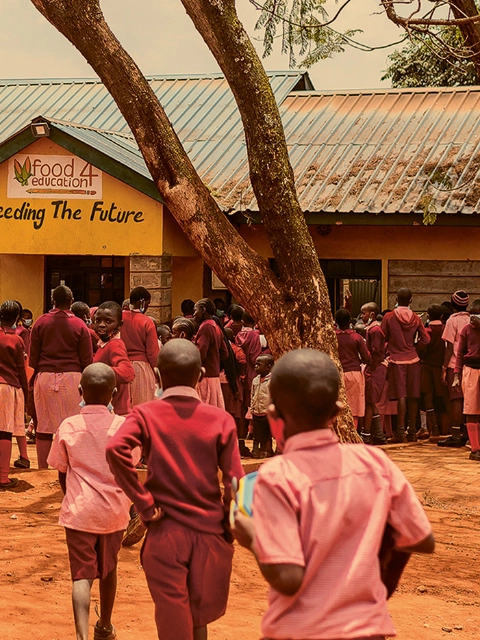73 million of the most vulnerable primary school students globally lack access to school meals.
Source: UN World Food Programme 2020

Ruiru ist eine Stadt im Kiambu County in Kenia. Sie liegt drei Kilometer von der Stadtgrenze von Nairobi entfernt.
Die Einwohnerzahl lag im Jahre 1999 noch bei 100.000, bis 2005 stieg sie auf etwa 220.000 an. Die Fläche beträgt 292 km², das ist etwas weniger als die Fläche der Stadt Leipzig.
A child can’t learn well on an empty stomach. Food4Education in Kenya shows that investment in nutrition pays off.
As dawn breaks over Ruiru, a small town on the northeastern outskirts of Nairobi, Kenya’s capital, Lucy Wangui is getting ready to head home. The 45-year-old mother of three and her colleagues have spent the night at the Ruiru Primary School cooking hot lunches that will be served to thousands of schoolchildren at schools across the town as part of a groundbreaking school feeding program.
Celestine Nawire attends to a vat of rice in one of nine cookers, each with a capacity of 600 kilograms.
The program is run by Food4Education, a Nairobi-based non-profit that provides subsidized meals prepared in kitchens at three different schools and delivered to 33,000 students in total. Wangui believes it is a godsend. “The assurance that kids will get at least one warm meal is a big relief for parents struggling to make ends meet,” she says.
The food at Ruiru Primary School is cooked in a brightly painted kitchen. Just a few meters away is a modern building housing a gleaming steam kitchen – the next step in the evolution of Food4Education.
Food4Education founder Wawira Njiru inside the new steam kitchen.
It is a far cry from 2011, when founder Wawira Njiru, then a 20-year-old student at the University of South Australia studying nutrition and food science, decided to raise funds for school feeding. “I grew up in Ruiru and had the privilege of three meals a day, but many of the kids I played with did not. That led to disparities in opportunities. Unlike others, I was able to go to university,” she says.
Workers sort and weigh grain and other foodstuffs, many supplied by local farmers.
73 million of the most vulnerable primary school students globally lack access to school meals.
Source: UN World Food Programme 2020
Her first effort raised enough money to set up a makeshift kitchen to serve 100 students. It was such a success that Njiru, who returned to Kenya in 2014, established Food4Education and set up a permanent kitchen at Ruiru Primary School. By 2019, this kitchen was delivering 10,000 meals a day to students at local schools. Njiru’s next goal is to provide one million meals by 2026.
A student receives her Tap2Eat smart wristband. She can use it to make cashless lunch purchases.
At present, the meals are subsidized through donations and profits from a food delivery business. However, to achieve her new goal, Njiru needed to put the project on a more sustainable financial footing. By investing in efficient steam kitchen technology as well as exploiting economies of scale, Food4Education has already brought down the cost per meal by over 40 percent. The aim is that parents’ contributions will eventually cover the whole cost. Technology also plays a key role. The students pay for their meals using Tap2Eat smart wristbands. Parents put money on the wristbands using widely available mobile money services – they do not need a bank account to do this. “The technology helped us to scale up our program from 2,000 to 10,000 children within just a few months,” says Njiru.
Nothing in the economy gives a better rate of return than feeding kids.
The portions are generous, so there is always enough left to share with schoolmates or family.
The menu provides at least one-third of the Recommended Daily Allowance for calories and proteins.
Food4Education is already having a tangible impact. “Through my studies I learnt that nutrition affects cognitive ability. Here we have seen that providing school meals not only improves performance, but also reduces absenteeism,” she says. A study of schools participating in Food4Education has shown that they perform on average 20 percent better than schools without feeding programs. They also have more students transitioning to high school.
“School feeding is often seen as a cost rather than an investment,” says Njiru. “Yet according to the UN World Food Programme, for every shilling spent on school feeding, you get 9 shillings back. Nothing in the economy gives a better rate of return than feeding kids.”







